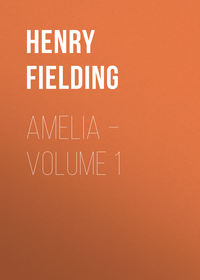 полная версия
полная версияJoseph Andrews, Vol. 2
Mr Adams rose very early, and called Joseph out of his bed, between whom a very fierce dispute ensued, whether Fanny should ride behind Joseph, or behind the gentleman's servant; Joseph insisting on it that he was perfectly recovered, and was as capable of taking care of Fanny as any other person could be. But Adams would not agree to it, and declared he would not trust her behind him; for that he was weaker than he imagined himself to be.
This dispute continued a long time, and had begun to be very hot, when a servant arrived from their good friend, to acquaint them that he was unfortunately prevented from lending them any horses; for that his groom had, unknown to him, put his whole stable under a course of physic.
This advice presently struck the two disputants dumb: Adams cried out, "Was ever anything so unlucky as this poor gentleman? I protest I am more sorry on his account than my own. You see, Joseph, how this good-natured man is treated by his servants; one locks up his linen, another physics his horses, and I suppose, by his being at this house last night, the butler had locked up his cellar. Bless us! how good-nature is used in this world! I protest I am more concerned on his account than my own." "So am not I," cries Joseph; "not that I am much troubled about walking on foot; all my concern is, how we shall get out of the house, unless God sends another pedlar to redeem us. But certainly this gentleman has such an affection for you, that he would lend you a larger sum than we owe here, which is not above four or five shillings." "Very true, child," answered Adams; "I will write a letter to him, and will even venture to solicit him for three half-crowns; there will be no harm in having two or three shillings in our pockets; as we have full forty miles to travel, we may possibly have occasion for them."
Fanny being now risen, Joseph paid her a visit, and left Adams to write his letter, which having finished, he despatched a boy with it to the gentleman, and then seated himself by the door, lighted his pipe, and betook himself to meditation.
The boy staying longer than seemed to be necessary, Joseph, who with Fanny was now returned to the parson, expressed some apprehensions that the gentleman's steward had locked up his purse too. To which Adams answered, "It might very possibly be, and he should wonder at no liberties which the devil might put into the head of a wicked servant to take with so worthy a master;" but added, "that, as the sum was so small, so noble a gentleman would be easily able to procure it in the parish, though he had it not in his own pocket. Indeed," says he, "if it was four or five guineas, or any such large quantity of money, it might be a different matter."
They were now sat down to breakfast over some toast and ale, when the boy returned and informed them that the gentleman was not at home. "Very well!" cries Adams; "but why, child, did you not stay till his return? Go back again, my good boy, and wait for his coming home; he cannot be gone far, as his horses are all sick; and besides, he had no intention to go abroad, for he invited us to spend this day and tomorrow at his house. Therefore go back, child, and tarry till his return home." The messenger departed, and was back again with great expedition, bringing an account that the gentleman was gone a long journey, and would not be at home again this month. At these words Adams seemed greatly confounded, saying, "This must be a sudden accident, as the sickness or death of a relation or some such unforeseen misfortune;" and then, turning to Joseph, cried, "I wish you had reminded me to have borrowed this money last night." Joseph, smiling, answered, "He was very much deceived if the gentleman would not have found some excuse to avoid lending it. – I own," says he, "I was never much pleased with his professing so much kindness for you at first sight; for I have heard the gentlemen of our cloth in London tell many such stories of their masters. But when the boy brought the message back of his not being at home, I presently knew what would follow; for, whenever a man of fashion doth not care to fulfil his promises, the custom is to order his servants that he will never be at home to the person so promised. In London they call it denying him. I have myself denied Sir Thomas Booby above a hundred times, and when the man hath danced attendance for about a month or sometimes longer, he is acquainted in the end that the gentleman is gone out of town and could do nothing in the business." – "Good Lord!" says Adams, "what wickedness is there in the Christian world! I profess almost equal to what I have read of the heathens. But surely, Joseph, your suspicions of this gentleman must be unjust, for what a silly fellow must he be who would do the devil's work for nothing! and canst thou tell me any interest he could possibly propose to himself by deceiving us in his professions?" – "It is not for me," answered Joseph, "to give reasons for what men do, to a gentleman of your learning." – "You say right," quoth Adams; "knowledge of men is only to be learned from books; Plato and Seneca for that; and those are authors, I am afraid, child, you never read." – "Not I, sir, truly," answered Joseph; "all I know is, it is a maxim among the gentlemen of our cloth, that those masters who promise the most perform the least; and I have often heard them say they have found the largest vails in those families where they were not promised any. But, sir, instead of considering any farther these matters, it would be our wisest way to contrive some method of getting out of this house; for the generous gentleman, instead of doing us any service, hath left us the whole reckoning to pay." Adams was going to answer, when their host came in, and, with a kind of jeering smile, said, "Well, masters! the squire hath not sent his horses for you yet. Laud help me! how easily some folks make promises!" – "How!" says Adams; "have you ever known him do anything of this kind before?" – "Ay! marry have I," answered the host: "it is no business of mine, you know, sir, to say anything to a gentleman to his face; but now he is not here, I will assure you, he hath not his fellow within the three next market-towns. I own I could not help laughing when I heard him offer you the living, for thereby hangs a good jest. I thought he would have offered you my house next, for one is no more his to dispose of than the other." At these words Adams, blessing himself, declared, "He had never read of such a monster. But what vexes me most," says he, "is, that he hath decoyed us into running up a long debt with you, which we are not able to pay, for we have no money about us, and, what is worse, live at such a distance, that if you should trust us, I am afraid you would lose your money for want of our finding any conveniency of sending it." – "Trust you, master!" says the host, "that I will with all my heart. I honour the clergy too much to deny trusting one of them for such a trifle; besides, I like your fear of never paying me. I have lost many a debt in my lifetime, but was promised to be paid them all in a very short time. I will score this reckoning for the novelty of it. It is the first, I do assure you, of its kind. But what say you, master, shall we have t'other pot before we part? It will waste but a little chalk more, and if you never pay me a shilling the loss will not ruin me." Adams liked the invitation very well, especially as it was delivered with so hearty an accent. He shook his host by the hand, and thanking him, said, "He would tarry another pot rather for the pleasure of such worthy company than for the liquor;" adding, "he was glad to find some Christians left in the kingdom, for that he almost began to suspect that he was sojourning in a country inhabited only by Jews and Turks."
The kind host produced the liquor, and Joseph with Fanny retired into the garden, where, while they solaced themselves with amorous discourse, Adams sat down with his host; and, both filling their glasses, and lighting their pipes, they began that dialogue which the reader will find in the next chapter.
CHAPTER XVII.
A dialogue between Mr Abraham Adams and his host, which, by the disagreement in their opinions, seemed to threaten an unlucky catastrophe, had it not been timely prevented by the return of the lovers
"Sir," said the host, "I assure you you are not the first to whom our squire hath promised more than he hath performed. He is so famous for this practice, that his word will not be taken for much by those who know him. I remember a young fellow whom he promised his parents to make an exciseman. The poor people, who could ill afford it, bred their son to writing and accounts, and other learning to qualify him for the place; and the boy held up his head above his condition with these hopes; nor would he go to plough, nor to any other kind of work, and went constantly drest as fine as could be, with two clean Holland shirts a week, and this for several years; till at last he followed the squire up to London, thinking there to mind him of his promises; but he could never get sight of him. So that, being out of money and business, he fell into evil company and wicked courses; and in the end came to a sentence of transportation, the news of which broke the mother's heart. – I will tell you another true story of him. There was a neighbour of mine, a farmer, who had two sons whom he bred up to the business. Pretty lads they were. Nothing would serve the squire but that the youngest must be made a parson. Upon which he persuaded the father to send him to school, promising that he would afterwards maintain him at the university, and, when he was of a proper age, give him a living. But after the lad had been seven years at school, and his father brought him to the squire, with a letter from his master that he was fit for the university, the squire, instead of minding his promise, or sending him thither at his expense, only told his father that the young man was a fine scholar, and it was pity he could not afford to keep him at Oxford for four or five years more, by which time, if he could get him a curacy, he might have him ordained. The farmer said, 'He was not a man sufficient to do any such thing.' – 'Why, then,' answered the squire, 'I am very sorry you have given him so much learning; for, if he cannot get his living by that, it will rather spoil him for anything else; and your other son, who can hardly write his name, will do more at ploughing and sowing, and is in a better condition, than he.' And indeed so it proved; for the poor lad, not finding friends to maintain him in his learning, as he had expected, and being unwilling to work, fell to drinking, though he was a very sober lad before; and in a short time, partly with grief, and partly with good liquor, fell into a consumption, and died. – Nay, I can tell you more still: there was another, a young woman, and the handsomest in all this neighbourhood, whom he enticed up to London, promising to make her a gentlewoman to one of your women of quality; but, instead of keeping his word, we have since heard, after having a child by her himself, she became a common whore; then kept a coffeehouse in Covent Garden; and a little after died of the French distemper in a gaol. – I could tell you many more stories; but how do you imagine he served me myself? You must know, sir, I was bred a seafaring man, and have been many voyages; till at last I came to be master of a ship myself, and was in a fair way of making a fortune, when I was attacked by one of those cursed guarda-costas who took our ships before the beginning of the war; and after a fight, wherein I lost the greater part of my crew, my rigging being all demolished, and two shots received between wind and water, I was forced to strike. The villains carried off my ship, a brigantine of 150 tons – a pretty creature she was – and put me, a man, and a boy, into a little bad pink, in which, with much ado, we at last made Falmouth; though I believe the Spaniards did not imagine she could possibly live a day at sea. Upon my return hither, where my wife, who was of this country, then lived, the squire told me he was so pleased with the defence I had made against the enemy, that he did not fear getting me promoted to a lieutenancy of a man-of-war, if I would accept of it; which I thankfully assured him I would. Well, sir, two or three years passed, during which I had many repeated promises, not only from the squire, but (as he told me) from the lords of the admiralty. He never returned from London but I was assured I might be satisfied now, for I was certain of the first vacancy; and, what surprizes me still, when I reflect on it, these assurances were given me with no less confidence, after so many disappointments, than at first. At last, sir, growing weary, and somewhat suspicious, after so much delay, I wrote to a friend in London, who I knew had some acquaintance at the best house in the admiralty, and desired him to back the squire's interest; for indeed I feared he had solicited the affair with more coldness than he pretended. And what answer do you think my friend sent me? Truly, sir, he acquainted me that the squire had never mentioned my name at the admiralty in his life; and, unless I had much faithfuller interest, advised me to give over my pretensions; which I immediately did, and, with the concurrence of my wife, resolved to set up an alehouse, where you are heartily welcome; and so my service to you; and may the squire, and all such sneaking rascals, go to the devil together." – "O fie!" says Adams, "O fie! He is indeed a wicked man; but G – will, I hope, turn his heart to repentance. Nay, if he could but once see the meanness of this detestable vice; would he but once reflect that he is one of the most scandalous as well as pernicious lyars; sure he must despise himself to so intolerable a degree, that it would be impossible for him to continue a moment in such a course. And to confess the truth, notwithstanding the baseness of this character, which he hath too well deserved, he hath in his countenance sufficient symptoms of that bona indoles, that sweetness of disposition, which furnishes out a good Christian." – "Ah, master! master!" says the host, "if you had travelled as far as I have, and conversed with the many nations where I have traded, you would not give any credit to a man's countenance. Symptoms in his countenance, quotha! I would look there, perhaps, to see whether a man had the small-pox, but for nothing else." He spoke this with so little regard to the parson's observation, that it a good deal nettled him; and, taking the pipe hastily from his mouth, he thus answered: "Master of mine, perhaps I have travelled a great deal farther than you without the assistance of a ship. Do you imagine sailing by different cities or countries is travelling? No.
"Caelum non animum mutant qui trans mare currunt.
"I can go farther in an afternoon than you in a twelvemonth. What, I suppose you have seen the Pillars of Hercules, and perhaps the walls of Carthage. Nay, you may have heard Scylla, and seen Charybdis; you may have entered the closet where Archimedes was found at the taking of Syracuse. I suppose you have sailed among the Cyclades, and passed the famous straits which take their name from the unfortunate Helle, whose fate is sweetly described by Apollonius Rhodius; you have passed the very spot, I conceive, where Daedalus fell into that sea, his waxen wings being melted by the sun; you have traversed the Euxine sea, I make no doubt; nay, you may have been on the banks of the Caspian, and called at Colchis, to see if there is ever another golden fleece." "Not I, truly, master," answered the host: "I never touched at any of these places." – "But I have been at all these," replied Adams. "Then, I suppose," cries the host, "you have been at the East Indies; for there are no such, I will be sworn, either in the West or the Levant." – "Pray where's the Levant?" quoth Adams; "that should be in the East Indies by right." "Oho! you are a pretty traveller," cries the host, "and not know the Levant! My service to you, master; you must not talk of these things with me! you must not tip us the traveller; it won't go here." "Since thou art so dull to misunderstand me still," quoth Adams, "I will inform thee; the travelling I mean is in books, the only way of travelling by which any knowledge is to be acquired. From them I learn what I asserted just now, that nature generally imprints such a portraiture of the mind in the countenance, that a skilful physiognomist will rarely be deceived. I presume you have never read the story of Socrates to this purpose, and therefore I will tell it you. A certain physiognomist asserted of Socrates, that he plainly discovered by his features that he was a rogue in his nature. A character so contrary to the tenour of all this great man's actions, and the generally received opinion concerning him, incensed the boys of Athens so that they threw stones at the physiognomist, and would have demolished him for his ignorance, had not Socrates himself prevented them by confessing the truth of his observations, and acknowledging that, though he corrected his disposition by philosophy, he was indeed naturally as inclined to vice as had been predicated of him. Now, pray resolve me – How should a man know this story if he had not read it?" "Well, master," said the host, "and what signifies it whether a man knows it or no? He who goes abroad, as I have done, will always have opportunities enough of knowing the world without troubling his head with Socrates, or any such fellows." "Friend," cries Adams, "if a man should sail round the world, and anchor in every harbour of it, without learning, he would return home as ignorant as he went out." "Lord help you!" answered the host; "there was my boatswain, poor fellow! he could scarce either write or read, and yet he would navigate a ship with any master of a man-of-war; and a very pretty knowledge of trade he had too." "Trade," answered Adams, "as Aristotle proves in his first chapter of Politics, is below a philosopher, and unnatural as it is managed now." The host looked stedfastly at Adams, and after a minute's silence asked him, "If he was one of the writers of the Gazetteers? for I have heard," says he, "they are writ by parsons." "Gazetteers!" answered Adams, "what is that?" "It is a dirty newspaper," replied the host, "which hath been given away all over the nation for these many years, to abuse trade and honest men, which I would not suffer to lye on my table, though it hath been offered me for nothing." "Not I truly," said Adams; "I never write anything but sermons; and I assure you I am no enemy to trade, whilst it is consistent with honesty; nay, I have always looked on the tradesman as a very valuable member of society, and, perhaps, inferior to none but the man of learning." "No, I believe he is not, nor to him neither," answered the host. "Of what use would learning be in a country without trade? What would all you parsons do to clothe your backs and feed your bellies? Who fetches you your silks, and your linens, and your wines, and all the other necessaries of life? I speak chiefly with regard to the sailors." "You should say the extravagancies of life," replied the parson; "but admit they were the necessaries, there is something more necessary than life itself, which is provided by learning; I mean the learning of the clergy. Who clothes you with piety, meekness, humility, charity, patience, and all the other Christian virtues? Who feeds your souls with the milk of brotherly love, and diets them with all the dainty food of holiness, which at once cleanses them of all impure carnal affections, and fattens them with the truly rich spirit of grace? Who doth this?" "Ay, who, indeed?" cries the host; "for I do not remember ever to have seen any such clothing or such feeding. And so, in the mean time, master, my service to you." Adams was going to answer with some severity, when Joseph and Fanny returned and pressed his departure so eagerly that he would not refuse them; and so, grasping his crabstick, he took leave of his host (neither of them being so well pleased with each other as they had been at their first sitting down together), and with Joseph and Fanny, who both expressed much impatience, departed, and now all together renewed their journey.
BOOK III
CHAPTER I.
Matter prefatory in praise of biography
Notwithstanding the preference which may be vulgarly given to the authority of those romance writers who entitle their books "the History of England, the History of France, of Spain, &c.," it is most certain that truth is to be found only in the works of those who celebrate the lives of great men, and are commonly called biographers, as the others should indeed be termed topographers, or chorographers; words which might well mark the distinction between them; it being the business of the latter chiefly to describe countries and cities, which, with the assistance of maps, they do pretty justly, and may be depended upon; but as to the actions and characters of men, their writings are not quite so authentic, of which there needs no other proof than those eternal contradictions occurring between two topographers who undertake the history of the same country: for instance, between my Lord Clarendon and Mr Whitelocke, between Mr Echard and Rapin, and many others; where, facts being set forth in a different light, every reader believes as he pleases; and, indeed, the more judicious and suspicious very justly esteem the whole as no other than a romance, in which the writer hath indulged a happy and fertile invention. But though these widely differ in the narrative of facts; some ascribing victory to the one, and others to the other party; some representing the same man as a rogue, while others give him a great and honest character; yet all agree in the scene where the fact is supposed to have happened, and where the person, who is both a rogue and an honest man, lived. Now with us biographers the case is different; the facts we deliver may be relied on, though we often mistake the age and country wherein they happened: for, though it may be worth the examination of critics, whether the shepherd Chrysostom, who, as Cervantes informs us, died for love of the fair Marcella, who hated him, was ever in Spain, will any one doubt but that such a silly fellow hath really existed? Is there in the world such a sceptic as to disbelieve the madness of Cardenio, the perfidy of Ferdinand, the impertinent curiosity of Anselmo, the weakness of Camilla, the irresolute friendship of Lothario? though perhaps, as to the time and place where those several persons lived, that good historian may be deplorably deficient. But the most known instance of this kind is in the true history of Gil Blas, where the inimitable biographer hath made a notorious blunder in the country of Dr Sangrado, who used his patients as a vintner doth his wine-vessels, by letting out their blood, and filling them up with water. Doth not every one, who is the least versed in physical history, know that Spain was not the country in which this doctor lived? The same writer hath likewise erred in the country of his archbishop, as well as that of those great personages whose understandings were too sublime to taste anything but tragedy, and in many others. The same mistakes may likewise be observed in Scarron, the Arabian Nights, the History of Marianne and le Paisan Parvenu, and perhaps some few other writers of this class, whom I have not read, or do not at present recollect; for I would by no means be thought to comprehend those persons of surprizing genius, the authors of immense romances, or the modern novel and Atalantis writers; who, without any assistance from nature or history, record persons who never were, or will be, and facts which never did, nor possibly can, happen; whose heroes are of their own creation, and their brains the chaos whence all their materials are selected. Not that such writers deserve no honour; so far otherwise, that perhaps they merit the highest; for what can be nobler than to be as an example of the wonderful extent of human genius? One may apply to them what Balzac says of Aristotle, that they are a second nature (for they have no communication with the first; by which, authors of an inferior class, who cannot stand alone, are obliged to support themselves as with crutches); but these of whom I am now speaking seem to be possessed of those stilts, which the excellent Voltaire tells us, in his letters, "carry the genius far off, but with an regular pace." Indeed, far out of the sight of the reader,









